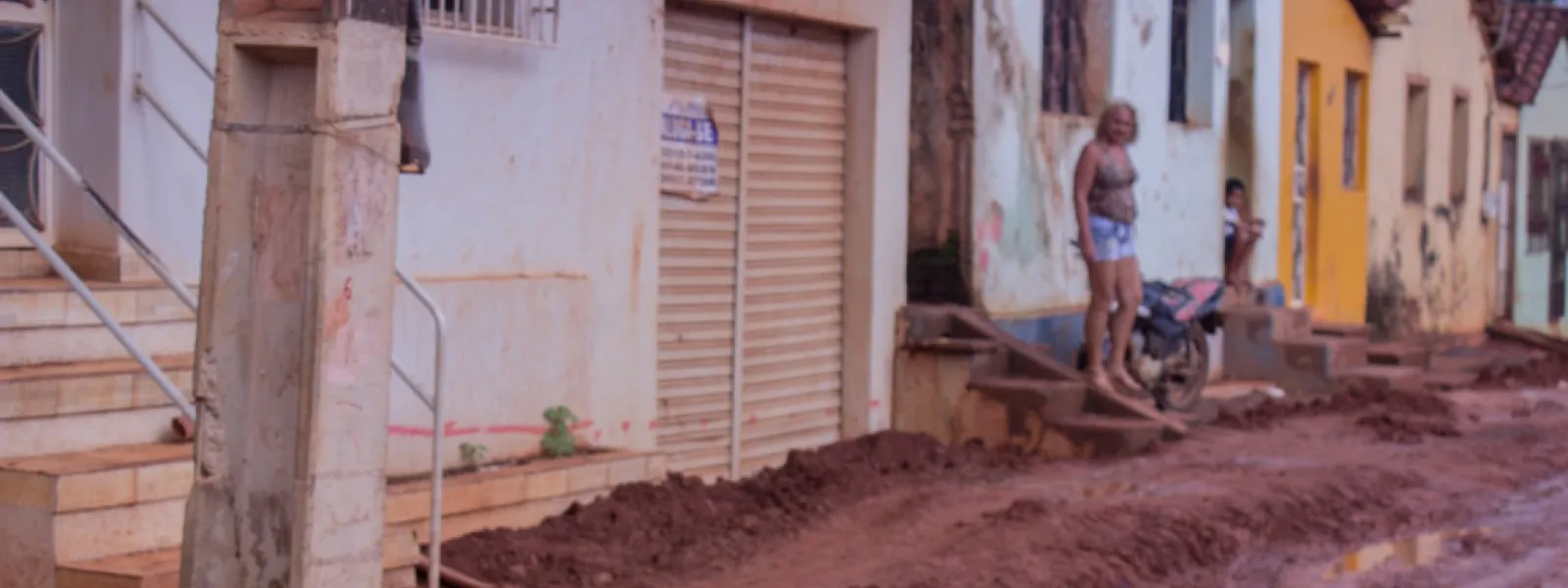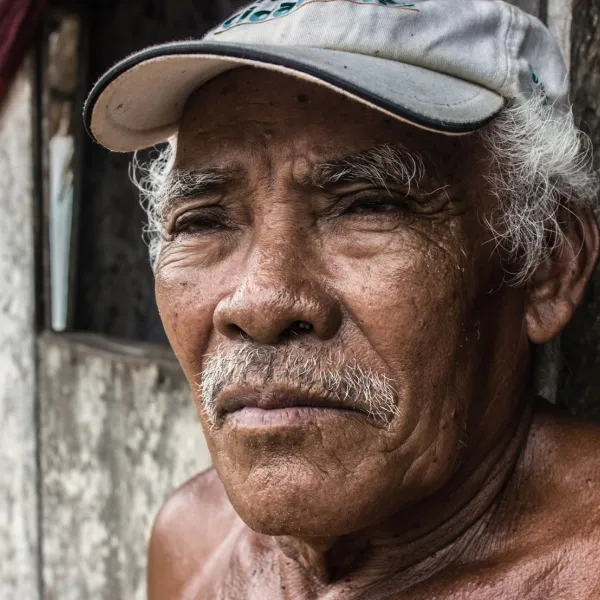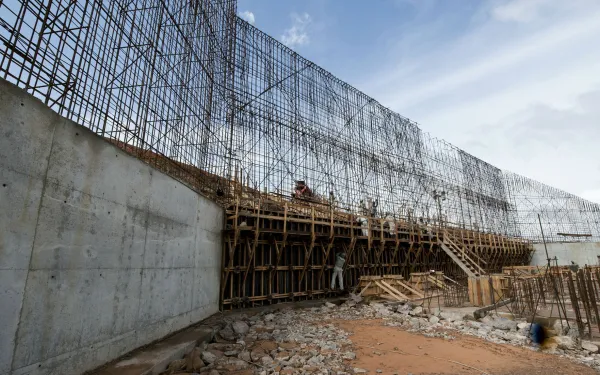
Project
Photo: Maíra Irigaray / Amazon WatchHolding Brazil accountable for the Belo Monte Dam
When fully operational, Belo Monte will be the third-largest dam in the world, constructed in one of the most important ecosystems on the planet: the Amazon rainforest. It sits on the Xingu River in Pará, a state in northern Brazil. The reservoir will cover 500 square kilometers of forest and farmland—an area the size of Chicago.
For the people of the Xingu, construction of Belo Monte has meant loss of access to water, food, housing, work and transportation. At least 20,000 people have been displaced.
The government and construction consortium began to construct the dam without first consulting the people of the region, many of whom are indigenous. They flouted international human rights law, which requires the free, prior and informed consent of affected indigenous communities. Brazil also failed to comply with precautionary measures issued by the Inter-American Human Rights Commission, which were intended to protect the life, health, and integrity of local communities.
Though Belo Monte began operations in May 2016, it is not yet operating at full capacity. In April 2016, a federal court suspended the dam's operating license because the consortium in charge did not complete basic sanitation works in Altamira, the city nearest to and most affected by the dam.
Partners:

Related projects
Latest News

Belo Monte Dam may begin operations despite noncompliance
The dam has failed to comply with conditions for the protection of the health, integrity and way of life of affected communities. Organizations reiterate the validity of the precautionary measures granted by the Inter-American Commission on Human Rights in favor of the indigenous communities of the Xingú River basin, whose situation of risk has worsened. Altamira, Brazil & Washington, DC – The Belo Monte dam is applying for authorization to begin operations, with construction reported at 70 percent complete. This authorization may happen despite the fact that the project has failed to comply with conditions necessary to protect the health, integrity and way of life of affected communities, including the indigenous peoples of the Xingú river basin. Civil society organizations solicited the Inter-American Commission for Human Rights to maintain the precautionary measures granted in 2011 in favor of the indigenous peoples of the Xingú river basin. They did so as a response to the Brazilian government’s request that the Commission lift the measures, which were authorized to avoid irreparable damage to the rights of the communities. The Interamerican Association for Environmental Defense (AIDA), Justiça Global, the Sociedad Paraense de Defensa de los Derechos Humanos (SDDH) and the Movimiento Xingú Vivo para Siempre (MXPVS) filed the brief on behalf of indigenous and river communities affected by Belo Monte. The organizations argued before the Commission that the social and environmental situation surrounding Belo Monte continues to be serious and urgent, and could cause irreparable damages. Their arguments are based on a recent report by the Socio-Environmental Institute of Brazil (ISA), as well as on official government data that include information from health and indigenous protection authorities and the Public Ministry. The ISA report analyzes in detail the situation of Altamira, Pará—the region where Belo Monte is being constructed—and emphasizes the human rights violations and irregularities of the project. The report warns that necessary conditions do not exist for the Brazilian Institute of Environment and Renewable Natural Resources (IBAMA) to grant the project’s operating license. If granted, the license would authorize the filling of the dam, and, thus, the final diversion of the Xingú River. One part of the dam would then begin operation. According to the ISA report, measures to avoid the project’s impacts on health, education and basic sanitation have not been met. This neglect will lead to further damage, such as the fracturing of indigenous communities, saturation of public health services, lower quality education, and greater forest degradation. “The consequences we announced years ago are now a reality,” said Astrid Puentes Riaño, co-director of AIDA. “The filling of the dam, scheduled for the year’s end, will cause the loss of homes and land, and the modification of the traditional lifestyles and livelihoods of Xingú communities. Brazilian authorities and the Commission must act effectively to prevent this disaster.” It is clear that the conditions necessary for Norte Energía, the consortium in charge of the project, to receive the license are not in place. The vice-governor of Pará explained that although the construction is 70 percent complete, only 30 percent of the social and environmental conditions have been met. Similarly, the Attorney of the Republic of Altamira, Thais Santi, said that the consortium is not respecting the protection plan for indigenous lands, the principal condition for the protection of the peoples of the Xingú. The decision on the authorization of Belo Monte must also take into account the recent corruption scandal that has engulfed the project. The investigation Lava Jato, which began a year ago, exposed a massive network of corruption involving the government and Brazil’s largest construction companies. A senior executive, currently in prison on corruption charges, mentioned in his declaration how they had set up and executed bribes for the construction of Belo Monte. The Comptroller General (CGU) thereafter decided to investigate the use of public funds in the project. “The lack of effective control in the execution of the project has made the consequences much worse than anticipated. Giving free reign of operation to the dam at this time would mean completely shutting down the options available to avoid major social and humanitarian disasters in the region,” said Sandy Faidherb of SDDH.
Read moreBelo Monte: Determined to achieve justice
By Flavia Amaral, AIDA attorney As construction of the world’s third-largest hydroelectric dam, Belo Monte, moves forward, social impacts and unrest continue. In the coming few months, close to 2,000 families are scheduled to be relocated from their homes in Altamira, on the Xingu River in Brazil, to newly built housing. Last year, another 2,000 families were resettled. The reconfiguring of the region continues to create social ills. The new settlements are far from downtown Altamira, and there is no public transportation. Many new houses are already showing structural problems, and there is little to no basic infrastructure such as health care centers, schools, and sewer treatment facilities. Also, as part of being relocated, a family must agree that they have no complaint or concern with the Belo Monte hydroelectric plant or the company responsible for the construction, a difficult ask for many who are giving up so much. For many indigenous communities, there is an explosion of illegal logging on their lands. Norte Energia,the consortium building Belo Monte, has not implemented required monitoring systems or constructed surveillance stations which would deter the logging. As a result, FUNAI, Brazil’s government agency that oversees Indian rights, reports that the situation is critical, and especially serious for the lands of the indigenous Arara people. Throughout the area, demonstrations continue by those who seek justice, recognition and compensation. Last month, hundreds of farmers held protests demanding land tenure, credit, and improvements to family farming. Two people died after being hit by a car that broke the blockade of protesters. This situation represents the unease, unrest, and violence that permeates the region. Clearly, the construction of Belo Monte has caused enormous impact in the Xingu River Basin – well before it’s operational phase. Four years ago, on the request of AIDA and partner organizations in Brazil, the Inter-American Commission on Human Rights took an important step forward for the people of the region. It requested that the Brazilian government adopt precautionary measures to prevent irreparable damage to the rights of indigenous communities whose cultural integrity and way of life were at risk from the construction of Belo Monte. Clearly, after all these years, these threats remain: Brazil has not honored the precautionary measures. AIDA will continue working until we ensure that the environment and the rights of communities in Brazil’s Xingú River Basin are fully respected. We believe that the Commission still has time to act, and that there is potential for the Brazilian government to reframe its policies and practices to become a global model for equity and justice. Thank you so much for your ongoing support of our work for the people and the environment of the Amazon!
Read moreBelo Monte: The Urgency of Effectively Protecting Human Rights
Four years ago this month, the Inter-American Commission on Human Rights took an important step forward for the peoples of the Xingú River Basin. It requested that the Brazilian government adopt precautionary measures to prevent irreparable damage to the rights of indigenous communities along the Amazonian tributary. Their cultural integrity and way of life were, and still are, at risk from the construction of the world’s third-largest dam, Belo Monte. Yet that major victory for those fighting to protect life on the Xingú has been diluted with time. As the decision weakened, so too did confidence in the Commission, an organ of the Organization of American States (OAS) charged with ensuring the protection of human rights on the continent. The Initial Request In November 2010, AIDA and partner organizations in Brazil requested precautionary measures from the Commission in a context of gravity and urgency characterized by: An irregular licensing process. An insufficient Environmental and Social Impact Assessment (ESIA), which contained neither all possible impacts nor the mitigation measures needed to guarantee the communities’ rights, and was not translated into the indigenous languages of the affected populations. The project’s failure to comply with more than 60 social, environmental and indigenous provisions established in the previous license as safeguards for the rights of the affected. Absence of consultation with affected indigenous communities and lack of their free, prior and informed consent. In response, the Commission requested that Brazil immediately suspend construction and all licensing of the dam until the project complied with the following conditions: Undertake consultation processes that are of good faith and culturally appropriate, with the goal of achieving the free, prior, and informed consent of affected communities. Ensure that affected communities have access to the Environmental and Social Impact Statement in an understandable format, which includes translation into indigenous languages. Adopt measures to protect the cultural integrity and way of life of indigenous peoples, including those in voluntary isolation, and to prevent the spread of diseases and epidemics among affected communities. The Response of Brazil and the OAS The Brazilian Government rejected the measures, calling them "precipitous and unwarranted." In response, Brazil withdrew its envoy from the Commission and recalled its ambassador to the OAS. Then, claiming a need for economic austerity, Brazil suspended funding to the Commission and defaulted on its annual compulsory contribution to the OAS. The outlook worsened when the Secretary General of the OAS, José Miguel Insulza, told the BBC: "The Commission makes recommendations. They are never mandatory orders… no country will be violating a treaty if they don’t do what the Commission asks. The Commission has no such binding force." These undermining comments provided several hostile member States with justification for launching a process to "reform" the Inter-American Human Rights System. The controversial process lasted more than two years and, rather than strengthen the Commission, the hostile States actually attempted to undermine its autonomy and weaken its mechanisms. One Step Back On July 29, 2011, just four months after granting the precautionary measures, the Commission modified them. It withdrew its request for suspension of construction and licensing, claiming the fundamental argument had turned into a debate, which went beyond the scope of the precautionary measures, on whether prior consultation had been conducted with the indigenous communities and whether they had given their informed consent for the project. Instead, the Commission requested that Brazil adopt new measures to protect the way of life and personal and cultural integrity of indigenous peoples in voluntary isolation, as well as the health and territory of all affected indigenous communities. This change represented a major setback, not just for the indigenous communities of the Xingú, but also for the thousands of communities throughout the region whose cultural integrity and way of life are at risk from the heedless implementation of projects like Belo Monte. Brazil’s indigenous communities had hoped that the Commission would stand by its decision to suspend the dam, and would protect them while the case – presented in 2011 by AIDA and partner organizations from Brazil – was underway. Up Against Time After four years, Brazil has not only breached the precautionary measures, but has also repeatedly requested that they be lifted. Worse still, the government has allowed construction of the Belo Monte Dam to continue, and the project is now 70 percent complete. A few months ago, the company in charge of construction, Norte Energia S.A., requested the dam’s operating license from the Brazilian Institute of Environment and Natural Resources. Once granted the license, they will begin to fill the dam’s reservoir and, with it, flood a portion of the Amazon half the size of Rio de Janeiro. The Commission has yet to petition the Brazilian government to determine whether or not the project’s authorization included a process of prior consultation This important step remains despite the fact that, when modifying the precautionary measures, the Commission itself noted that the discussion had to happen in the context of a petition. What’s the risk? When the Commission finally makes a decision on the case it may be too late to prevent damages to affected communities. A Major Challenge Although there has been some progress in protecting affected communities as a direct result of the precautionary measures, which the Brazilian government has yet to recognize officially, the process thus far has clearly demonstrated that the Inter-American Human Rights System is imperfect and vulnerable to political pressure. This vulnerability must be overcome. We must focus on building a truly efficient System that works best for its beneficiaries: the victims of human rights abuses. Four years after what seemed like an important victory, Belo Monte has taught us that if we seek to protect human rights in the region effectively, governments must not be allowed to jeopardize the system established for that purpose through political and economic pressure. Due to the realities of the region, many cases like Belo Monte have come, and will continue to come, before the System. While they are not easy to resolve, we mustn’t choose inaction in the face of suffering. In the case of Belo Monte, the Commission still has time to act. It’s our hope that this case will become a model for equitable access to justice. At AIDA, we will continue working until we ensure that the environment and the rights of communities in Brazil’s Xingú River Basin are fully respected.
Read more